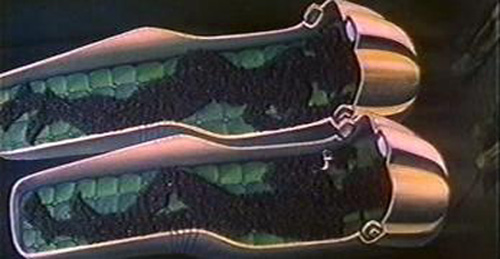There Will Come Soft Rains (1984) – dir. Nozim To’laho’jayev
Good morning! Robot speaking.
Uzbekfilm has produced roughly 5 feature films and animations per year since 1925, both for an independent Uzbekistan and as part of the Soviet Union. This film, produced under the auspices of the latter during the Cold War, adapts Ray Bradbury’s 1950 short story about an automated house whose mechanisms continue their daily chores after its occupants have been vaporized in a nuclear strike. It’s easy understand why this story would be on the minds of a country locked in a tense arms race. The similarities between this animation and the Bradbury story demonstrate a common fear of the fallout of war, even as some stark differences remind us of the nature of conflict at the time.
Much of the horror in the film comes from the unfamiliar motion of cutout animation (a style that distinguished Monty Python a decade or so earlier). The unreality of the movements coupled with the sound design makes an overtly terrifying atmosphere; I’m trying to imagine under the best of circumstances my children waking to a Kissinger-like baritone assuring them “It might be sunny outside.” The film alters a singular image from story. In Bradbury’s story, all that remains of the house’s family members is “their images burned on wood in one titanic instant, a small boy, hands flung into the air; higher up, the image of a thrown ball, and opposite him a girl, hands raised to catch a ball which never came down.” These silhouettes are replaced in the film with black ash outlines of the family in their beds. The ashes, while begging some logistical questions as to why only these bodies are incinerated and are only today sliding out of the beds, similarly suggest a suddenly vanquished human race that didn’t even have time to bring their shadows along with them.
Even though the dates are changed from August 4, 2026 to New Year’s Eve of the same year*, the location remains conspicuously the same. Allendale, California is named specifically in the film. There are several explicit reminders that this takes place in the US, down to an automated playing of The Star-Spangled Banner at midnight. Despite this, movie’s house is governed in a much more Soviet-like manner, adding the deep-voiced robot that centralizes house activities. In Bradbury’s house the automation systems seem to work more or less independent of each other. The story has two systems capable of speech: a clock calling out the time and a “tape recorder” that apparently takes vocal input like an Alexa (receiving no human commands, the recorder defaults to shuffle mode and recites the Sara Teasdale poem that shares its title with the story).
In the film a bird flies through a broken window, falls to provide the proper password, and is pursued by the robot unto the destruction of the house. This could be read as a premonition of the collapse of the Soviet Union or an illustration of Marx’s assurance that capitalism will eventually destroy itself from within, take your pick. For its part, Bradbury’s house dies of a fire started by a falling tree branch, a natural death to a mechanized being.
In its repeated insistence of the American setting, the film appears to repurpose Bradbury’s warning to all of mankind into a directed warning to an enemy nation. But it’s unlikely this film would be seen in the US (it’s barely available there now). And if it’s meant to depict a missile launch against the US as a victory, it’s a terribly depressing one. Bradbury’s universal message is still intact, dressed with something acceptable to the film’s place and time. Bradbury could publish a fantasy about his home country being destroyed, Uzbeki animators could not. Regardless, in an abandoned world “not one will know of the war, not one will care at last when it is done,” and the robots will clean up the ashes regardless of their nationality.
*The short story originally took place in 1985 and was moved to 2026 in later publications. I presume it was not for a diminishing thirst for nuclear destruction, but due to the disappointingly long gestation of the Roomba.

